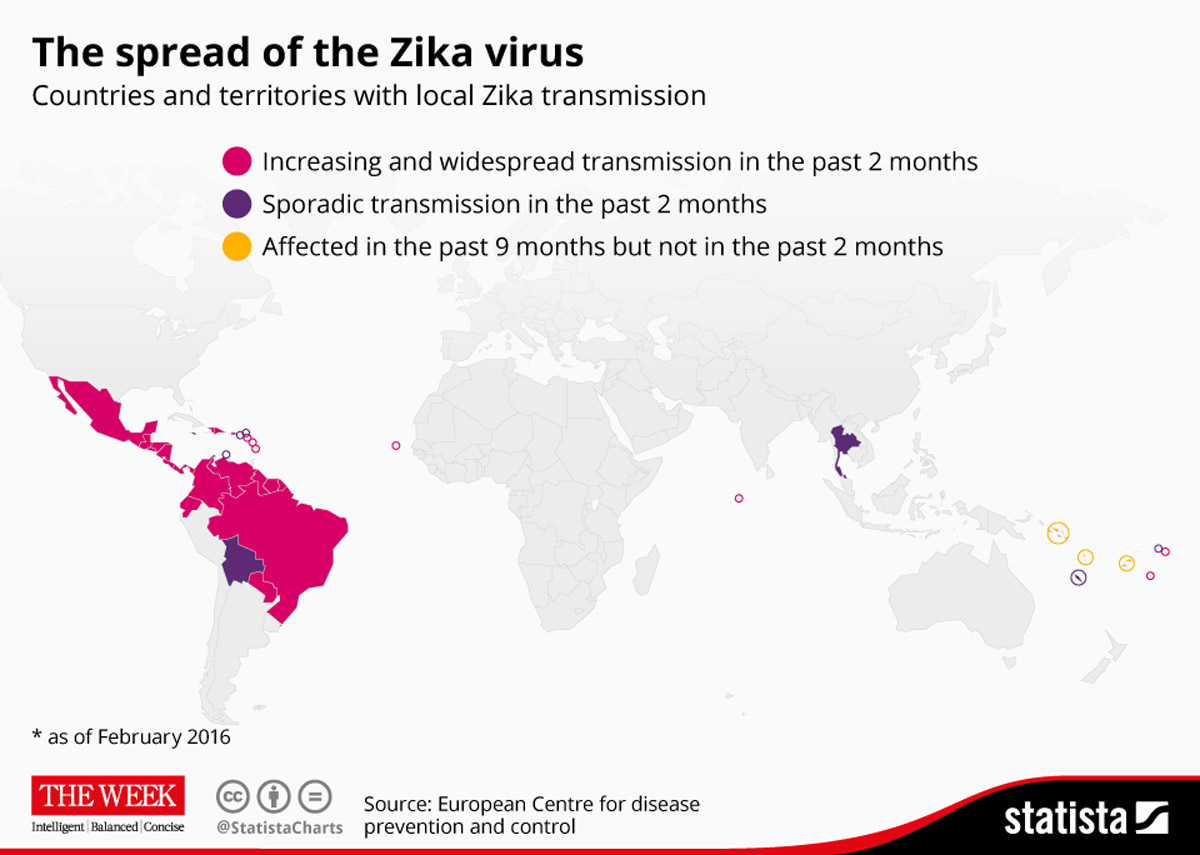Zika virus: everything you need to know about the disease
Travel warnings issued to pregnant women after outbreak is linked to severe birth defects

A free daily email with the biggest news stories of the day – and the best features from TheWeek.com
You are now subscribed
Your newsletter sign-up was successful
Pregnant women in Britain, the US and Australia have been advised to postpone travel to parts of Latin America because of an outbreak of the mosquito-borne Zika virus, which has been linked to severe birth defects.
The disease has been detected in at least 23 countries, including Brazil, Mexico and Venezuela, and the World Health Organization (WHO) has warned the virus is likely to spread even further across the Americas.

What is it?
The Week
Escape your echo chamber. Get the facts behind the news, plus analysis from multiple perspectives.

Sign up for The Week's Free Newsletters
From our morning news briefing to a weekly Good News Newsletter, get the best of The Week delivered directly to your inbox.
From our morning news briefing to a weekly Good News Newsletter, get the best of The Week delivered directly to your inbox.
The virus is spread by the Aedes aegypti mosquito, which also transmits dengue fever and chikungunya. The first human case was identified in Nigeria in 1954, and outbreaks were later reported in other parts of Africa, south-east Asia, the Pacific Islands and now Latin America.
Symptoms, which are typically mild and only appear in one in four people, include a low-grade fever, joint and muscle pain and conjunctivitis.
How dangerous is it?
For most people, the infection isn't harmful. However, the disease has been linked to microcephaly, a severe and potentially deadly birth defect which impacts brain development.
A free daily email with the biggest news stories of the day – and the best features from TheWeek.com
Brazil reports that nearly 4,000 babies were born with the condition in the last four months. "The link hasn't been confirmed, but a small number of babies who died had the virus in their brain and no other explanation for the surge in microcephaly has been suggested," says the BBC.
As a result, officials have urged pregnant women and those planning on becoming pregnant soon to consider postponing travel to any region where Zika outbreaks are ongoing. The WHO provides weekly updates to this list of affected countries.
Is it curable?
There is no specific treatment or vaccine currently available. People in affected areas are urged to avoid mosquito bites by wearing insect repellent and clothing that covers their arms and legs. Authorities have also been clearing areas of stagnant water where mosquitoes breed.
"Until we discover a vaccine, we will need to rely on the population to help us remove the conditions under which the mosquito reproduces," said Brazilian President Dilma Rousseff. "In the meantime, we need to provide all the assistance the children [with microcephaly] and their families require."
Infographic by www.statista.com for TheWeek.co.uk
-
 How the FCC’s ‘equal time’ rule works
How the FCC’s ‘equal time’ rule worksIn the Spotlight The law is at the heart of the Colbert-CBS conflict
-
 What is the endgame in the DHS shutdown?
What is the endgame in the DHS shutdown?Today’s Big Question Democrats want to rein in ICE’s immigration crackdown
-
 ‘Poor time management isn’t just an inconvenience’
‘Poor time management isn’t just an inconvenience’Instant Opinion Opinion, comment and editorials of the day
-
 Epstein files topple law CEO, roil UK government
Epstein files topple law CEO, roil UK governmentSpeed Read Peter Mandelson, Britain’s former ambassador to the US, is caught up in the scandal
-
 Iran and US prepare to meet after skirmishes
Iran and US prepare to meet after skirmishesSpeed Read The incident comes amid heightened tensions in the Middle East
-
 Israel retrieves final hostage’s body from Gaza
Israel retrieves final hostage’s body from GazaSpeed Read The 24-year-old police officer was killed during the initial Hamas attack
-
 China’s Xi targets top general in growing purge
China’s Xi targets top general in growing purgeSpeed Read Zhang Youxia is being investigated over ‘grave violations’ of the law
-
 Panama and Canada are negotiating over a crucial copper mine
Panama and Canada are negotiating over a crucial copper mineIn the Spotlight Panama is set to make a final decision on the mine this summer
-
 Why Greenland’s natural resources are nearly impossible to mine
Why Greenland’s natural resources are nearly impossible to mineThe Explainer The country’s natural landscape makes the task extremely difficult
-
 Iran cuts internet as protests escalate
Iran cuts internet as protests escalateSpeed Reada Government buildings across the country have been set on fire
-
 US nabs ‘shadow’ tanker claimed by Russia
US nabs ‘shadow’ tanker claimed by RussiaSpeed Read The ship was one of two vessels seized by the US military